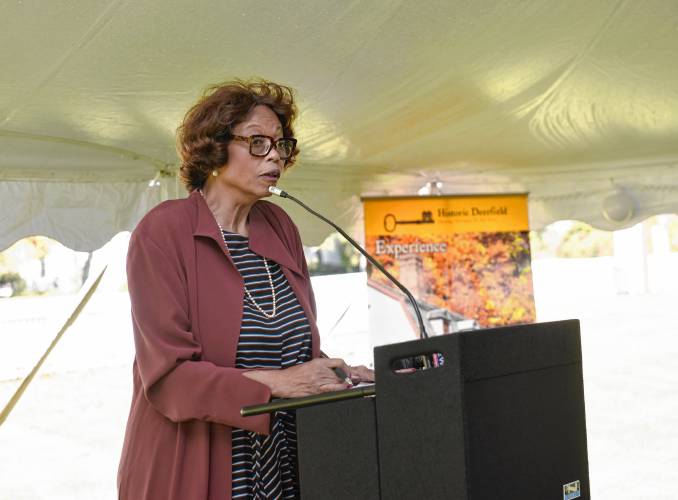
By Chris Larabee in the Greenfield Recorder on October 12, 2022
DEERFIELD — Up and down Old Main Street, houses from the Colonial era still stand, now turned into educational opportunities by Historic Deerfield in an effort to share the town’s rich history.
That history, however, didn’t always consist of the full representation, until Wednesday morning.
In partnership with the Witness Stones Project, Historic Deerfield unveiled 19 bronze memorial plaques outside 12 houses to commemorate the enslaved men, women and children whose stories are often untold or buried by the sands of time. By the mid-18th century, enslaved people lived in more than one-third of the houses on Old Main Street.
Speaking at a ceremony outside the Ashley House on Wednesday, Historic Deerfield President and CEO John Davis said the goal of the markers is to tell the full history of Deerfield while humanizing those who had their human rights stolen from them. “In some cases, we know little about the individuals. Even their names have been lost to time. In others, we know more about them, and our efforts to learn as much as we can about their lives and their stories are ongoing,” Davis said. “We seek to honor the humanity in each person and to recognize their many contributions in building Deerfield into the important historic locus that it is today.”
The Witness Stones Project is a Connecticut-based educational organization dedicated to restoring the history of enslaved people across the Northeast. Each marker is a 4-inch-by-4-inch bronze plaque identifying the person along with a birth or baptism date.
According to the Witness Stones Project’s website, this is the first project the organization has undertaken in Massachusetts.
Joining Davis in speaking was Witness Stones Project board of directors co-chair and former Connecticut state Rep. Pat Wilson Pheanious. As a member of the ninth generation of a now 11-generation family that has lived in the United States for hundreds of years, Wilson Pheanious shared her own experience in learning about the history of her enslaved ancestors and how it changed her view of her own history, as well as the country’s.
“The significance of finding my family ’s history was profound,” she said. “If you don’t know your full history, you cannot know your full value. And that is as true for a nation as it is for an individual.”
In learning her own history, Wilson Pheanious said she was able to find herself a place in history, despite the dark times her ancestors experienced.
“This knowledge doesn’t detract from my affection, it makes me love America more. I realized how very deeply I was already invested. My family had fought for this country before it was America,” she said. “I know that America is mine because 300 years of my ancestors’ sweat and tears earned her for my people. … They earned their place in our history in this land with their blood, and they shaped and fought for America’s existence and freedom at a time when their own was denied.”
In a conversation after the ceremony, Davis said these memorial plaques can help start to repay part of the “debt that we owe these 19 individuals,” while also potentially allowing someone to find their own ancestral connections.
Davis added these markers are just the start of a long-term partnership with the Witness Stones Project and the museum’s efforts to tell an all-inclusive history of Deerfield. He said they plan to launch an educational curriculum for teachers and students in area schools next year. Other long-term plans include a mobile app and an online database.
“This is really the beginning of the work we hope to do with the Witness Stones,” Davis said. “We encourage folks to come and follow the markers.” More information about the Witness Stones Project can be found at witnessstonesproject.org.


